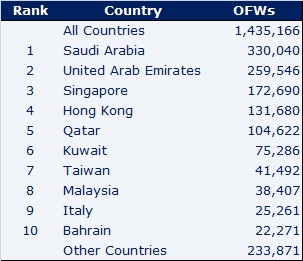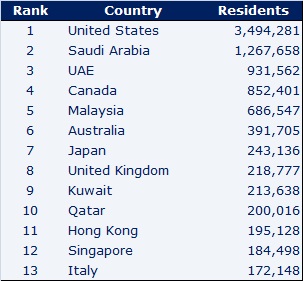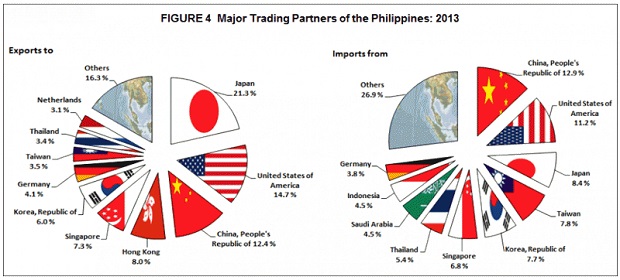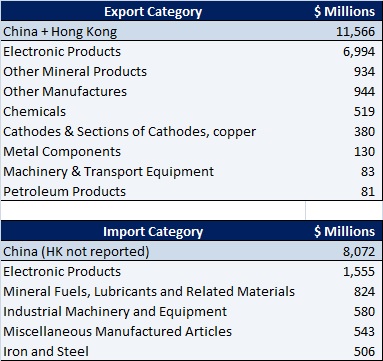Economic war with China (rev)
 I have greatly simplified this blog from its original version. It seemed to me upon re-reading what I had originally done to be a rather presumptuous engagement by a foreigner in affairs that are not really his business.
I have greatly simplified this blog from its original version. It seemed to me upon re-reading what I had originally done to be a rather presumptuous engagement by a foreigner in affairs that are not really his business.
So what is left are a few facts I gathered to try to understand what the impacts would be of economic sanctions that might be employed by the Philippines if China remained in Philippine economic territory after an ITLOS ruling in favor of the Philippines.
Let me provide you some of the information I have gathered, along with a random comment or two.
Philippine Workers and Residents in Hong Kong
TABLE 1 shows OFW distributions by nation, as published by the Philippine Overseas Employment Administration.
Hong Kong has the fourth highest number of OFW’s at 131,680 workers. That is 9.2% of the total number of OFW’s reported by the POEA for 2012. Why the total is short of the 2.2 million OFW’s we read about elsewhere is beyond me, unless the rosters have grown dramatically during the past two years. Let’s set that aside as a minor technical matter for now.
But wait a minute! Where is the US? And Canada?
For that, we have to understand that the official OFW count is much different than the total count of Filipinos who live in other nations. Many workers have become career workers and citizens of the host nation, or are relatives of workers.
What does the total residency count show?
For that, we can go to Wikipedia and the article Wiki overseas Filipinos. Those distributions are shown in TABLE 2.
Hong Kong is not all that popular as a place of residency for Filipinos. The United States is, with the main difference being opportunity for a career. If there is any question as to whether the Philippines is tied more closely to China, by culture, or the United States, by history, the residency table provides a clear answer.
Given that any economic sanctions would turn China against the Philippines, it is helpful to know how many Filipinos could be affected. Or perhaps withdrawal of OFWs from Hong Kong would be on someone’s idea list for sanctions.Chinese Investment in the Philippines
I found the following chart fascinating. It shows investment by different countries in the Philippines, by year.
Foreign Direct Investment in the Philippines by Country of Investor (Dynamic Chart)
I would highly recommend that you load up the chart, check the boxes for China, Japan and the US, then slide the time bar from left to right across the chart.
It is very clear that friction with China is already affecting Philippine economics. The US and Japan are becoming more important as sources of investment, and the Netherlands, too, interestingly enough. Chinese investment is stagnant.
The following article gives anecdotal confirmation of this point: Why China gave such meager aid to the Philippines. The economic relationship is already broken, no matter what the diplomats say.
What about Philippine investment in China? Here is additional anecdotal information that some Filipino companies find the Chinese market too large, too important, and too profitable not to pursue: Jollibee targets 500 stores in China by 2014
China is Jollibee’s largest market after the Philippines. The company operates 2,074 stores in the Philippines and 554 stores overseas (400 in China) under the following brands: Jollibee, Greenwich, Chowking, Red Ribbon, Mang Inasal and Burger King. The Chinese shops could be shut down in a tit for tat battle with sanctions.
If I were looking for overseas markets, I think China would not be on the list, just from the pragmatics of what is coming down the pike. Once economic sanctions start, they are difficult to stop.
One of the things that China’s intrusion into Philippine waters does is block Filipino energy companies from investing in the exploration for oil and gas. Effectively, China has blocked the Philippines from mining her own resources. Banning Chinese land-based mining in the Philippines is actually a logical counter to what China is doing by blocking the Philippines from mining her own seas.
If the Philippines were to adopt sanctions to punish China, I’d imagine that would end up on someone’s “first priority list”.
Trade of Goods with China
China is blocking Filipino fishermen from fishing in Philippine waters so banning the sale of certain Filipino food or other products to China would be a logical counter to China’s blockade of Filipino fishing. Restricting trade would definitely be on anyone’s possible sanctions list.
Could other markets such as the U.S. or Australia or Japan take up the slack? Here are export and import shares to different countries as set forth by the National Statistics Office (NSO Foreign Trade Statistics):
Total Philippine trade in 2013 was US $120.7 billion. The top ten partners shown above represented 76 percent of that ($90.7 billion). China PLUS Hong Kong represented $19.6 billion, Japan $17.3 billion, the US $15.3. China alone is third, but with Hong Kong, is the number one trading partner.
Exports from the Philippines to China consist mainly of electronic products with minerals (mining products) important, too.
Imports from China are also predominantly electronic products, along with mineral fuels (coal, oil?).
Basically, it appears that the Philippines receives electronic products, pieces them together, and exports them to other manufacturers for final assembly. It is an important industry in the Philippines, providing a lot of workshop jobs.
Then we eventually come to the most puzzling head-scratcher of them all: why does China not buy goods from the Philippines instead of stealing them?
The import/export business in the Philippines funds a lot of jobs. Does it fund as many jobs as there are OFW’s in Hong Kong, one is inclined to wonder. 132,000 jobs?
That is an area for further study. But the point becomes clear. Sanctions require the Philippines to endure substantial pain and, as a poor country, the pain is pronounced.
Conclusion
It will take perhaps a year for the international court to wrap up its decision on the Philippine appeal for arbitration, and another year or two for the arguing to take place and for the Philippines to draw the conclusion that China is not leaving Philippine waters.
Would economic sanctions impel China to move?
China does not act according to logic, but according to a sense of divine right to control Asia. I personally suspect nothing will impel China to move, short of force. But one must go through the steps, and the pains, or accept China’s claim.
One interesting question is whether or not Hong Kong needs to be considered a part of any sanctions that might be considered. Hong Kong is playing out its own tense drama to try to retain some measure of independence from China. Hong Kong may actually be allied with Philippine interests on the matter of sovereign rights. It may be advisable to try to avoid confrontation with Hong Kong.
What might Philippine policy-makers be thinking? I can only guess.
Perhaps they are thinking of a stepwise progression of sanctions on China, one leading to the next, as long as China continues to unlawfully occupy the Philippine Exclusive Economic Zone:
- Diplomatic sanctions
- Travel sanctions
- Suspend Chinese mining activities in the Philippines
- Suspend further OFW placements to Hong Kong
- Curtail exports of minerals and natural products to China
- Curtail imports of certain products from China
- Curtail all exports to China
- Curtail all imports from China
- Nationalize Chinese mines
- Nationalize Chinese businesses
- Remove OFWs and residents from Hong Kong
The Philippine “arrogance” of imposing sanctions would infuriate China, no doubt. China would roll through her own set of sanctions, including taking over Philippine companies operating in China. China might conceivably impose a sea blockade of the Philippines.
The great risk to China is that other nations would follow the Philippine lead and China would be cut off from other markets, too.
A fighting war at some point becomes more likely as China exercises a determination to punish the Philippines and acquire resources vital to economic growth.
But, for a peaceful nation like the Philippines, as filing for arbitration was a necessary, peaceful step, economic sanctions that try to “wake China up” would be a necessary and peaceful step.
The alternative is to concede the seas to China and get on with things. Some might call it the Neville Chamberlain strategy, and others the “discretion is the better part of valor” option.
Shakespeare’s Falstaff may have been a fool, but he did survive . . .
I’d guess, however, that the idea of being occupied may not go down easily in the Philippines. I’d hate to be the president who cedes Philippine seas to China.
Comments
18 Responses to “Economic war with China (rev)”Trackbacks
Check out what others are saying...-
[…] Download ImageMore @ joeam.com […]




Careful with Philippines official statistics. E.g in 2007 the Philippines show $5.71 exports to China, Chinese statistics show $23.12 imports from the Philippines for the same year. ($17.5 billion smuggled out of the country without paying any taxes.) Similar in the other direction. Under the current administration the figures might be a little more reliable.
I see more subtle and profitable actions from their side:
• The opposite from trade sanction, the flooding of the country with illegal imports to kill the local industries. The smuggling contracts might already be drafted, the logistics well planned.
• On the financial markets they will create large swings to extract huge profits. Insider trading is easy here.
• Create an illegal immigration wave of poor and uneducated Chinese migrants with a criminal past.
• Increase support for a Muslim independence movement and for the NPA.
That smuggling valuation is depressing. It may also explain why the NSO trade numbers vary from calculations using WTO statistics, and understate values moving between states. You also make clear that non-military war can be extremely pernicious. Perhaps whoever is president would seek congressional powers to declare China an enemy state for occupying Philippine territory, authorize a form of martial law to stop such Filipino-supported activities, put army troops at the docks, and take other steps to stop personal gain at national expense. A part of that would be to declare such activities treasonous for aiding and abetting the enemy, non-bailable, with really long jail terms. A dictator would likely re-instate the death penalty for treason.
That such acts are common in the Philippines does say that national bonding, or patriotism, is very, very weak. It’s like freedom here means freedom to lie, cheat and steal. The responsibility part is missing altogether.
I also see in the form of gross omission that I have left off financial sanctions from the list. I’d think early on, financial transactions between China and the Philippines would be curtailed in some respect.
The grand gesture and the concomitant publicity excluded, will China even notice if we impose economic sanctions?
The economic pain would be nothing to China. The “PR” pain would mean a lot and could even provoke a military reaction.
Yes, the only to solution to awaken the dragon king China are to stop all kind business with them.
Most Chinese that dwells here in Philippines hate communism, they will be one of the victims of
shutting down trade with China, they may not be able to contact their love ones through regular
set-up but perhaps on another media such as FB or Skype.
China will surely respond in bad manner however, they will not last, since the domino effect of trade
sunctions may also come alive with Vietnam, Japan, Malaysia and other countries as well that
encounter rudeness from reds.
As the sucntion continues, there might be civil war within main land China or worst CHina may
release nukes and start 3rd world war, which may coincide with Nostradamus prediction that
a small country will wage war with big country and the small country will win with the help of
bigger country….anyone can never tell…
Even without this current issue of the terrotorial disputes, perhaps, main land china may
become a democratic country in case Civil war erupted within. The trend of communism
and socialism is becoming small every decade, see the brakdown of the Wall? Separation
of Union Soviets…next big thing, collapse of Red regime…chinese are as well people
who day by day learned from the outside world via internet. China town are built all over the
world just to retain their identity, this is a fact that they dont want communism…
Yes, it astounds me in our day of reason, of great discovery, of learning, that a leadership group would be so thuggish and fundamentally unkind toward others. It is the old core of military men, I suppose, stoked up on their own testosterone and ego, who so like to dominate others, both within and outside China. I wish they would simply implode and come back as thoughtful and considerate people who respect others. Then China would emerge as a respected world leader. People are not ants to be subjugated in some ruthless pecking order of importance.
And hopefully a pecking order of importance that is not equated to financial wealth, imperialistic and safeguarded with the biggest guns, as in the free market ideology of the US and in the new communism of China. I hope a new generation of idealistic “reds” will emerge that will look at the world as a whole, including the less gifted, including the insects and whales, caring for all the real valuables money can’t buy, such as solidarity, kindness, respect, a quite sunset over the ocean… No more infantile comparing who has the biggest. The current “politics” will not bring us there. “Downtrodden of the world, unite!”
The great enlightenment. I like Warren Buffet who makes bazillions by investing in companies and complains that he is not being taxed enough. For sure, financial wealth in America is just as thuggish and discriminatory as communist military thugs at using and abusing the downtrodden. Somehow, though, I think you are not among the downtrodden, you just relate to them because your brain is wise enough and compassionate enough to wrap around what is happening.
I like this monk with little bells around his ankle to warn the insects so they don’t get downtrodden. I like Stephen Hawkins explaining what happened before the big bang.
Yep, I knew it. I like Bill Gates working hard to give his money away.
One thing that I could not ever stop thinking about is the way the United Nations had kept silent about this issue that the Philippines brought to them for arbitration. Isn’t there any law or agreement in the convention of the law of the sea of which both China and the Philippines are both signatories that in case of conflicting claims, as in the situation that brings tension in the area, that no one could/should make any actions that each one will oppose so as to lessen or ease the tension?
Or couldn’t that governing body issue any restraining order for anybody, or for China, to wait for their decision?
Or had it grown impotent and irrelevant just because China is now a military power to reckon with?
Just asking?
It is peculiar the UN has been silent, isn’t it? It is like they wait until after the fighting starts to urge peace rather than take steps to try to calm China’s aggressive acquisition of the seas now. Perhaps they believe the matter is before the UN court ITLOS, and that is sufficient. The problem, of course, is that the UN has no enforcement mechanisms other than what various states agree to do. And generally they can’t agree on anything. But the weight of the UN’s voice surely could have helped. Good point, for sure.
Just picked up this news from Reuters printed by Yahoo news on August 7, 2014 that said that ‘China plans to build lighthouses on 5 islands in the South China Sea in defiance of calls from the United States and the Philippines for a freeze on such activity to ease tension over rival claims.’
‘At least 2 of the islands upon which China said it will put up ;lighthouses appear to be in waters also claimed by Vietnam.’
And the UN has yet to issue any statement to help diffuse the tension. What could it really be up to since they said nothing when China put up an oil rig in front of Vietnam waters?
Indeed. The UN should be the conscience of the peaceful world, and is not, in this situation.
HI Joe,
There appears to be no basis for the Philippines to resort to sanctions. It seems that China’s posturing is all that; posturing. This happened before in the case of Taiwan (then Formosa). There were threats indeed but they just remained as that. Reason was that the US was already prepositioned at that time to meet such a threat. The US 7th Fleet and the US 13th Air Force were in the Philippines. Guam, where the Strategic Air Command was then based, was just a short flight away.
Today, China sits on what economics experts believe to be one of the biggest real estate bubble in history. Some say 3x bigger than the one which imploded in the US, if CBS’ 60 Minutes reporting is to be believed. It also has a festering Islamic problem in it’s interior and a very politically restless HongKong. Taken altogether, plus the historical fear of economic scarcity of the Chinese, then maybe our concerns are overblown. The Chinese have so much problems at their home front that creating more problems may not be their order of the day.
Here are some information worth considering.
1. It’s true that the ASEAN is militarily powerless against China because of the lack of a credible collective naval force. Some of its member countries may have the experienced armies but moving troops around would certainly be a problem. This option therefore may not be worth considering.
2. The Philippines has good bargaining chips for negotiations or meeting threat for threat. One is already in place. The recently signed EDCA brings back the US’ naval projection in the region and with it the US 7th Fleet. The second would be a potential mutual defense treaty with Japan which is hungry for allies vs. China. It can also turn nuclear overnight (I am l quoting Teddy Locsin, Jr. loosely on this one). China is wary, if not downright scared, of the Japanese after their WWII experience with that country. This option remains open.
Nice piece and what a patience you have for those statistics!
More power.
vernon
Ahahahaha, patience for statistics. I hate the little monsters.
You present a very strong case that the Philippines is best served by a strategy of PATIENCE. Pushing, pushing, pushing against China may not be necessary. You should have done that case as a guest blog, for it is excellent. (AND you still can!)